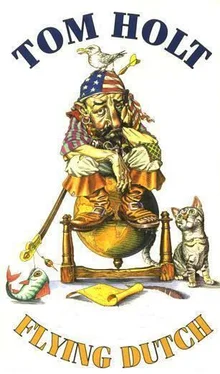Tom Holt - Flying Dutch
Здесь есть возможность читать онлайн «Tom Holt - Flying Dutch» весь текст электронной книги совершенно бесплатно (целиком полную версию без сокращений). В некоторых случаях можно слушать аудио, скачать через торрент в формате fb2 и присутствует краткое содержание. Год выпуска: 1991, Жанр: Фэнтези, Юмористическая проза, на английском языке. Описание произведения, (предисловие) а так же отзывы посетителей доступны на портале библиотеки ЛибКат.
- Название:Flying Dutch
- Автор:
- Жанр:
- Год:1991
- ISBN:нет данных
- Рейтинг книги:5 / 5. Голосов: 1
-
Избранное:Добавить в избранное
- Отзывы:
-
Ваша оценка:
- 100
- 1
- 2
- 3
- 4
- 5
Flying Dutch: краткое содержание, описание и аннотация
Предлагаем к чтению аннотацию, описание, краткое содержание или предисловие (зависит от того, что написал сам автор книги «Flying Dutch»). Если вы не нашли необходимую информацию о книге — напишите в комментариях, мы постараемся отыскать её.
Flying Dutch — читать онлайн бесплатно полную книгу (весь текст) целиком
Ниже представлен текст книги, разбитый по страницам. Система сохранения места последней прочитанной страницы, позволяет с удобством читать онлайн бесплатно книгу «Flying Dutch», без необходимости каждый раз заново искать на чём Вы остановились. Поставьте закладку, и сможете в любой момент перейти на страницу, на которой закончили чтение.
Интервал:
Закладка:
The girl recognised that her train of thought was becoming alarmingly metaphysical, but when you are stuck in Paddington station at a quarter to midnight with nothing to read, you can afford to indulge flights of fancy. Plato would have loved the Bakerloo Line.
I may not be Dutch, she said to herself, but I’m positive I would hate to live for ever. She remembered that week in the middle of the summer holidays when she was young, that one, inevitable week when the joy of not being at school had worn off and the dread of going back to school had not yet taken hold. That week when there was no longer anything to do, when everyone else had gone off with their parents to Jersey, when there was nothing on the television except Wimbledon, and cousin Marian from Swansea came to stay. That week that was free of all the pressures of doing the things you hated doing, devoid of all the pleasures of doing the things you liked doing, that week that lasted at least a month and probably longer. No crime a human being could commit, however terrible, could merit a punishment as dreadful as another of those weeks of killing time. Perhaps she should stop thinking along these lines, before she found out just exactly how shallow her mind really was.
It was then she remembered hearing a voice somewhere above her head at some stage during the evening, which had said that the angels and the love interest were all rubbish, but that the smell had been the real reason—or words to that effect. It was peculiar, to say the least, that her brain should seek to filter out this scrap of jetsam from the rubbish that her memory was sorting and discarding; her mind, she reckoned, was like the little grill thing over the plug-hole which catches fragments of cauliflower and pasta shells when the washing up bowl is emptied. She was reckoning thus when sleep finally caught her out, and she slept through Warwick Avenue and only just woke up in time to scramble out of the train at Maida Vale and walk home the long way.
There is one pub in Southampton which it is impossible to get yourself thrown out of no matter what you do or say, and there the newcomer ran into someone he knew very well.
At first they tried to avoid each other, since it was three days yet before they had to go back to the ship, and then they would be together again, inseparable, for another seven years. But this plan broke down when the newcomer realised that he had run out of money.
“Antonius,” said the newcomer to his friend in Dutch, “lend me a flyer till payday.”
Antonius felt in the pocket of his shirt and found a five pound note, which he gave to his companion. His companion’s name, for the record, was Johannes, and he and Antonius had been born in the same village south of Antwerp over four hundred and thirty years before. Barring shore leaves like this, they had been out of each other’s company for a period exceeding eight hours exactly once in four hundred and seventeen of those years, when Johannes’ mother had suspected that her son had caught the plague and locked him up in the barn for a few days.
Neither of them would have chosen to have it this way, since they didn’t get on very well and never had. Johannes was a short, noisy man with a hairy face and hairy arms, who liked drinking a lot and falling over. What Antonius liked doing best was standing quite still, unfocussing his eyes, and thinking of nothing at all. Each of them found the other remarkably uncongenial, and the only point on which they were united and could talk for more than three minutes without losing their temper with each other was their dislike of everyone else on board the ship, and in particular Captain Vanderdecker.
“After all,” said Johannes, a few minutes later, as they sat in a corner of the bar under the dartboard and drank their beer, “he was the one got us into this in the first place.”
“That’s right,” replied Antonius. “All his fault.”
A dart bounced out of treble fifteen and point first onto Antonius’ brown, bald head. He extracted it and handed it back to its owner.
“What the hell did he want to go drinking that stuff for in the first place?” Johannes continued, picking a grain of chalk dust out of his beer as he spoke. “He should have known it would end up all wrong.”
“He just didn’t think,” Antonius agreed. “No consideration for others.”
“And then dropping it,” said Johannes bitterly, “into the beer-barrel.”
“Typical,” said Antonius. It was a word he was very fond of and saved for special occasions. He didn’t want to wear it out by overuse.
“This beer,” said Johannes, unconsciously echoing his captain, “grows on you after a bit. You could get used to it.”
“It’s got a taste, though,” Antonius asserted. “You want another?”
“Might as well.”
So they had another, and another, and two or three more after that, and then they went outside to get some air. By now they were feeling quite relaxed, and Antonius remembered the girl who lived round the corner. They decided to go and visit her. They did this every time they came to England, just as, every time, they forgot that she had died in 1606 and that her house was now a car park. They always left a note though, saying that they were sorry to have missed her and would be sure to drop in next time. Since the building of the car park they had taken to sticking these notes behind the windscreen wipers of the parked cars, and once they had left one on the car of an avid and knowledgeable local historian, who had read it and was quite ill for months afterwards.
The plump man, who was also an accountant, although a vastly more important one than the girl, made himself a cup of lemon tea and tried to forget that he had wasted a performance of The Flying Dutchman at Covent Garden, with Neustadt singing Senta, on a cultural void like Jane Doland. Next to his career, he loved opera above all things and a failure to appreciate it was a crime that could not be forgiven. He opened his briefcase, switched on his calculator and put Rienzi on the CD player. Slowly, like the return of spring, the wound began to heal.
TWO
The National Lombard Bank is situated in the very heart of downtown Bridport. It is the sort of location any red-blooded bank manager would give his heart and soul for, right in the epicentre of a triangle formed by the town’s most beguiling attractions—the fish and chip shop, the Post Office and the traffic lights. In summer, whole families still make the difficult journey into Bridport from the surrounding countryside to stand and watch the traffic lights performing their dazzling son et lumiere; and although they now have a set of lights in Charmouth—a deliberate and cynical attempt to poach the holiday trade that has introduced much bitterness into the previously friendly relationship between the two communities—purists insist that the Bridport set has a purer green, a rosier red, a more scintillating amber than any others this side of Dorchester.
To a Sybaritic Londoner like Jane Doland, however, the Bridport Lights meant nothing more than another hold-up on her way to a not particularly pleasant assignment, and with the poverty of spirit that is the hallmark of the city-dweller she assumed that the small throng of children gathered round them were merely waiting to cross the road. She had no street-plan of Bridport to help her find the bank, but she located it nevertheless simply by looking straight in front of her as she drove in from the roundabout. A bank, she said to herself, what fun. This is well worth missing the London premiere of Crocodile Dundee 9 for.
The causes of momentous events are often so bewilderingly complex that even highly-trained historians are at a loss to unravel them. Men wise in their generation have gone grey, bald and ultimately senile in the great universities grappling with the origins of the English Civil War, the Peasants’ Revolt and the rise of Hitler, and it is doubtful now that the truth will ever be known. In contrast, the reason why Jane Doland was in Bridport, two years (give or take a week or so) since she had gone to see The Flying Dutchman at the Royal Opera House, was quite remarkably simple. A decree had gone out from Caesar Augustus that all the world should be taxed, and since this particular decree had had some viciously unexpected things in it about Advance Corporation Tax, all leave was cancelled in the offices of the leading accountancy firm where Jane Doland occupied a trivial and poorly-paid position, and accountants were dispersed like dazed bacilli into the bloodstream of British commerce to sort out the affairs of the National Lombard Bank, the firm’s largest and most complicated client. Since the National Lombard has more branches than all the trees in the New Forest, and the Bridport branch occupies roughly the same place in the bank’s list of priorities as that assigned to Leatherhead Rovers in the Football League, its affairs were unhesitatingly entrusted to Jane Doland’s skill, expertise and highly-motivated commitment.
Читать дальшеИнтервал:
Закладка:
Похожие книги на «Flying Dutch»
Представляем Вашему вниманию похожие книги на «Flying Dutch» списком для выбора. Мы отобрали схожую по названию и смыслу литературу в надежде предоставить читателям больше вариантов отыскать новые, интересные, ещё непрочитанные произведения.
Обсуждение, отзывы о книге «Flying Dutch» и просто собственные мнения читателей. Оставьте ваши комментарии, напишите, что Вы думаете о произведении, его смысле или главных героях. Укажите что конкретно понравилось, а что нет, и почему Вы так считаете.



![Brian Jacques - [Flying Dutchman 01] - Castaways of the Flying Dutchman](/books/128851/brian-jacques-flying-dutchman-01-thumb.webp)








